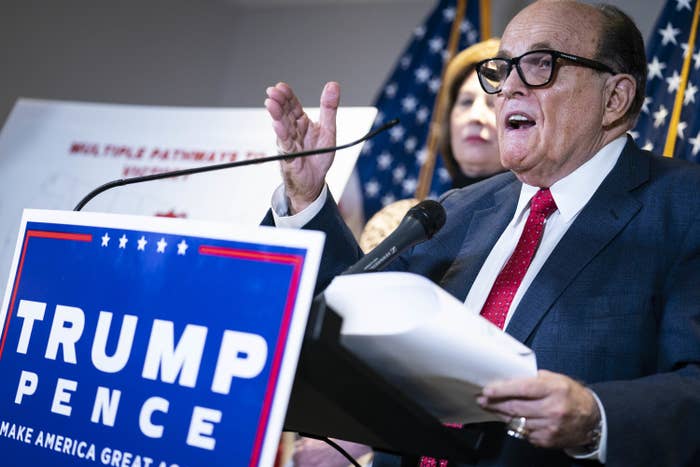Rudy Giuliani Has Been Suspended From Practicing Law In New York
Giuliani's suspension order cites his "demonstrably false and misleading statements" about the 2020 election.

Rudy Giuliani at a news conference about lawsuits contesting the results of the presidential election on Nov. 19, 2020.
Rudy Giuliani, former New York City mayor, has been suspended from practicing law in New York state for spreading lies about the election as a lawyer for former president Donald Trump.
In an order suspending Giuliani on Thursday, the appellate division of the New York Supreme Court that covers Manhattan wrote that it found “uncontroverted evidence” that Giuliani “communicated demonstrably false and misleading statements to courts, lawmakers and the public at large” to suggest that “victory in the 2020 United States presidential election was stolen from his client.”
Giuliani, a longtime lawyer for Trump, filed multiple lawsuits in the wake of the election on Trump’s behalf, all of which failed. He is currently being sued by Dominion Voting Systems for $1.3 billion for spreading lies about the company as he tried to help Trump overturn the election results.
His suspension from the New York State Bar is effective immediately, and it is indefinite “pending further proceedings before the Attorney Grievance Committee.” Giuliani will have 20 days to submit a request for a post-suspension hearing.
The Attorney Grievance Committee’s investigation into Giuliani is “ongoing,” the court wrote, but it sought an interim suspension. The court noted that suspending an attorney during an investigation is “serious,” but wrote that it was warranted and the misconduct at issue “will likely result in substantial permanent sanctions.”
“The seriousness of [Giuliani’s] uncontroverted misconduct cannot be overstated. This country is being torn apart by continued attacks on the legitimacy of the 2020 election and of our current president, Joseph R. Biden,” the court wrote.
Its decision was based on statements Giuliani made about the “2020 election at press conferences, state legislative hearings, radio broadcasts (as both a guest and host), podcasts, television appearances and one court appearance,” according to the order.
Part of Giuliani’s defense was that he didn’t know that the false statements that he made weren’t true. The court wrote that it could only consider knowingly false statements, but that the investigation had found several.
One of the lies that the court tackled, which Giuliani repeated on several podcasts at the time, was that Pennsylvania had counted more absentee ballots than it sent out to voters. This was not true. In his defense, Giuliani blamed “an unidentified member of his ‘team’ who ‘inadvertently’ took the information from the Pennsylvania website” which had the wrong information, according to the order.
“There is simply no proof to support this explanation,” the court wrote. “For instance, there is no affidavit from this supposed team member who is not identified by name or otherwise, nor is there any copy of the web page that purportedly listed the allegedly incorrect data. In fact, the only proof in this record is the official data on the Pennsylvania open data portal correctly listing the ballots requested as 3.08 million.”
The court also looked at Giuliani’s repeated references to dead people voting in Philadelphia in 2020, reporting a variety of numbers from 8,021 deceased voters to as many as 30,000, saying he didn’t “provide a scintilla of evidence for any of the varying and wildly inconsistent numbers of dead people he factually represented voted” there.
In addition to throwing out numbers, Giuliani has fixated on the boxer Joe Frazier, who died in 2011, claiming he continues to vote in Philadelphia. But the court found public records showing that his voter registration was canceled three months after he died. Giuliani told the court he relied on a “blogger” for that information. But the link he provided to the court does not claim that Frazier voted in 2020, is based on “an alleged review of public records from 2017 and 2018,” and quotes Giuliani himself, per the order.
The court found that those and other false statements Giuliani made concerning the 2020 election violated the state bar’s rules of professional conduct.
Giuliani had claimed that “he has and will continue to exercise personal discipline to forbear from discussing these matters in public anymore,” according to the order. But the court wrote that Giuliani has continued to spout lies about the election being stolen and dead people voting on his podcast, even since the committee asked the court to suspend him.
Giuliani had also argued that the investigation itself violated his First Amendment rights, but the court rejected that argument as well. “He does not attack the constitutionality of the particular disciplinary rules; he seemingly claims that they are unconstitutional as applied to him,” the court wrote.